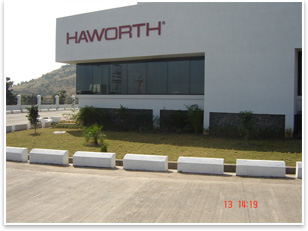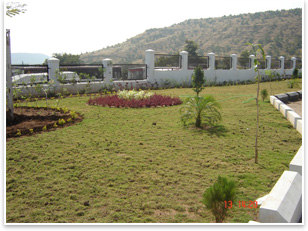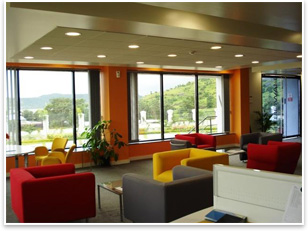
Indian Green by Heather Livingston
To meet their business needs in India, Haworth worked with Indian architect Rajiv Sapre with Dandekar Associates to design a 50,000-square-foot manufacturing plant and adjoining 7,800-square-foot showroom. Because of the harsh Indian climate, sustainability—water conservation, in particular—was a major consideration from the very beginning.
Intense heat is another environmental concern in Pune. Boucher says that to reduce the cooling load and improve energy and water efficiency, their structure is a “big, thick thermal-mass shell of a building that keeps that intense Indian sun out.” The masonry wall is covered with plaster and concrete and is at a minimum 16 inches thick. One interesting challenge to building in Pune was the unreliability of electricity. Boucher reports that Thursdays are called manufacturing holidays because the power might be on or it might be off. “It went off and on all the time, whether Thursday or not,” he says. “One of our goals is to become a sustainable company so there are a lot of things throughout that building and the site that are sustainable. Because of the [unreliable] electric power, that entire manufacturing plant is lit by daylight.” The manufacturing plant has skylights throughout, which allows the lighting to remain off throughout the day. In addition, the facility is naturally ventilated to provide health and performance protection. Boucher says that when the design discussions turned to construction waste, they were surprised to learn that in India it’s common to write into a contract that construction waste will not exceed 2 percent. “It would be a business waste,” he explains. Their mindset is: “Why would you even design or work to have any more than that? They don’t have a lot of landfills over there, so that’s not part of their vernacular or construction business.” He notes that they even would break down the wooden scaffolding at the end of a job and take it to the next site for set up.
“The analogy that I always talk about is gypsum,” he continues. “It’s a natural material that’s come a long way. You can get recycled gypsum where they take the paper off and re-use the gypsum. You can actually get paperless gypsum now, but if every time you reconfigure an office you’re tearing the gypsum down and sending it off to be recycled you’re wasting resources. It’s like driving five miles under the speed limit when you’re lost—you’re getting good mileage, but still wasting gas.” Although the Pune facility was completed in 2006, in December 2007 Haworth was notified that their showroom achieved LEED Gold certification, only the second in the country. Although the manufacturing portion of the facility didn’t aim for LEED, sustainability was a concern throughout the project, as evidenced by its features. “Our Pune showroom LEED certification confirms that our commitment to sustainability is universal yet tailored to each specific site,” said Franco Bianchi, Haworth president and CEO. “It is important for us to serve our customers effectively in this part of the world, yet we need to do so with as light an environmental footprint as possible. Pune shows we are dedicated to ‘walking the talk’ in North America and beyond.” |
||
Copyright 2008 The American Institute of Architects. All rights reserved. Home Page |
||
home
news headlines
practice
business
design
recent related
› The Next World’s Tallest Building? It’s Anybody’s Guess
› Eleven Selected for Interior Architecture Honor Awards
For more information on Haworth’s flexible office systems, visit their Web site.
Photos
Haworth exterior photo courtesy Mitch Boucher.
Haworth Pune landscaping photo courtesy Mitch Boucher.
Pune showroom photo courtesy Haworth.



